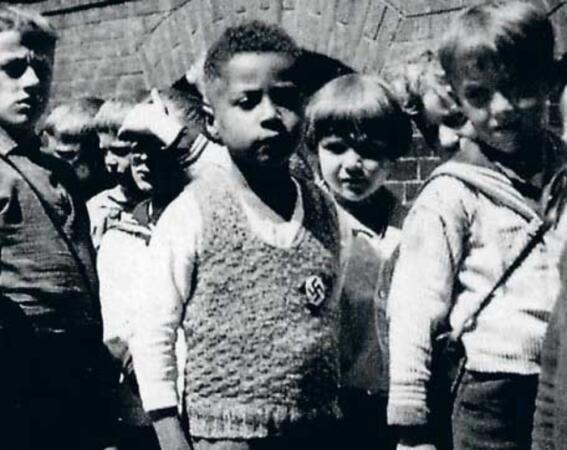
As a sort of compliment to recent posts on this blog about black life under Nazi rule, I recommend adding “Destined to Witness: Growing Up Black in Nazi Germany” to your watch lists. And luckily for you, much of the film is online (see below).
But first, the details…
It’s based on the biography of the same name by Hans-Jürgen Massaquoi, former Managing Editor of Ebony Magazine, who was born in Germany in 1926 to Bertha Nikodijevic, a German nurse, and Al-Haj Massaquoi, son of the Liberian Consul General in Hamburg, Germany.
It seems the book was first published (in English, anyway) in 1999 and was so popular in Germany, where it was entitled “Neger, Neger, Schornsteinfeger” (“Negro, Negro, Chimney Sweep”) that the autobiography remained on top of the bestselling list of the German weekly news magazine, Der Spiegel, for a couple of months. A screenplay of “Neger, Neger, Schornsteinfeger” was adapted from the book and a two-part film aired on German ZDF TV channel in 2006.
We’re all aware of the persecution of the Jews in Nazi Germany but, owing to the tiny minority of black people (most of them mixed race children of African WWI soldiers from the French colonies), other than being conferred second class citizenship, black Germans were by and large spared a similar fate. Having said that, in Rhineland, where most of the aforementioned WWI soldiers settled and had families, a secret program of sterilization and abortions on black and mixed race Germans was enforced.
While Massaquoi was spared from this indignity, he did suffer racial abuse and, despite being and considering himself German, was denied the dream of many young German children of the time, joining the Hitlerjugend (Hitler Youth Movement) and was also deemed unsuitable later on for service in the German military due to his racial “impurity.”
You can go to the Library of Congress website, where Audrey Fischer gives an account of Massaquoi’s life, from his privileged beginnings when he “associated black skin with superiority, since our servants were white,” to a more impoverished lifestyle after his grandparents and father returned to Liberia but his mother insisted he stay with her in Germany; how black American athletes, boxer Joe Louis and Olympic runner Jesse Owens, engendered pride in his African heritage; through to his emigration to the US where he served in the army, studied journalism and later went on to become Managing Editor of Ebony Magazine.
Hans Massaquoi died at 87 years old in January 2013.
Below are the first 60 minutes of what I’m assuming was the film that aired on German TV in 2006. If you’re anything like me, then you’ll be searching out the second 60 minutes, and will want to learn more about, not only Hans Massaquoi’s extraordinary life, but also that era of Afro-German history. One of the things I particularly liked in what I watched below are the two black American GI’s coming across the young Hans Massaquoi (played by Thando Walbaum) and being both delighted and surprised that he isn’t a soldier, but a German.
Destined to witness: Growing up black in Nazi… by Mariposalinda
Destined to witness: Growing up black in Nazi… by Mariposalinda
Destined to witness: Growing up black in Nazi… by Mariposalinda
Destined to witness: Growing up black in Nazi… by Mariposalinda
Destined to witness: Growing up black in Nazi… by Mariposalinda
Destined to witness: Growing up black in Nazi… by Mariposalinda
Destined to witness: Growing up black in Nazi… by Mariposalinda

